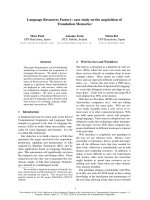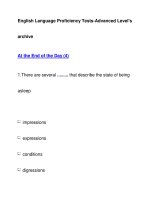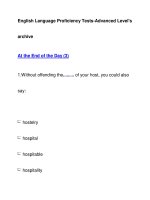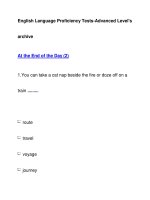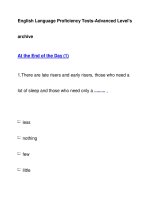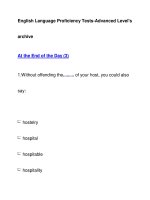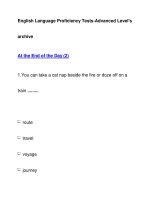English language needs for tour guiding from the perspectives of tour guiding professionals and english for tourism students from university of foreign languages hue university
Bạn đang xem bản rút gọn của tài liệu. Xem và tải ngay bản đầy đủ của tài liệu tại đây (1.13 MB, 117 trang )
MINISTRY OF EDUCATION AND TRAINING
UNIVERSITY OF FOREIGN LANGUAGES,
HUE UNIVERSITY
-----------------
LE XUAN THONG
ENGLISH LANGUAGE NEEDS FOR TOUR GUIDING
FROM THE PERSPECTIVES OF TOUR GUIDING
PROFESSIONALS AND ENGLISH- FOR -TOURISM
STUDENTS FROM UNIVERSITY OF FOREIGN
LANGUAGES, HUE UNIVERSITY
MA THESIS IN THEORY AND METHODOLOGY
OF ENGLISH LANGUAGE TEACHING
In partial fulfillment of the requirements for the degree of Master of Arts,
Hue University of Foreign Languages
HUE, 2019
MINISTRY OF EDUCATION AND TRAINING
UNIVERSITY OF FOREIGN LANGUAGES,
HUE UNIVERSITY
-----------------
LE XUAN THONG
ENGLISH LANGUAGE NEEDS FOR TOUR GUIDING
FROM THE PERSPECTIVES OF TOUR GUIDING
PROFESSIONALS AND ENGLISH –FOR- TOURISM
STUDENTS FROM UNIVERSITY OF FOREIGN
LANGUAGES, HUE UNIVERSITY
MA THESIS IN THEORY AND METHODOLOGY
OF ENGLISH LANGUAGE TEACHING
CODE: 8140111
SUPERVISOR: ASSOC.PROF.DR TRAN VAN PHUOC
HUE, 2019
i
BỘ GIÁO DỤC VÀ ĐÀO TẠO
ĐẠI HỌC HUẾ
TRƯỜNG ĐẠI HỌC NGOẠI NGỮ
-----------------
LÊ XUÂN THÔNG
NHU CẦU TIẾNG ANH ĐỐI VỚI NGÀNH HƯỚNG DẪN
DU LỊCH TỪ NHẬN THỨC CỦA HƯỚNG DẪN VIÊN
DU LỊCH CHUYÊN NGHIỆP VÀ SINH VIÊN TIẾNG ANH
CHUYÊN NGÀNH DU LỊCH TRƯỜNG ĐẠI HỌC NGOẠI NGỮ,
ĐẠI HỌC HUẾ
LUẬN VĂN THẠC SĨ LÝ LUẬN VÀ PHƯƠNG PHÁP
DẠY HỌC BỘ MÔN TIẾNG ANH
MÃ SỐ: 8140111
NGƯỜI HƯỚNG DẪN KHOA HỌC: PGS. TS. TRẦN VĂN PHƯỚC
HUẾ, 2019
ii
STATEMENT OF ORIGINALITY
This work has not previously been submitted for a degree or diploma in any
university. To the best of my knowledge and belief, the thesis contains no material
previously published or written by another person except where due reference is
made in the thesis itself.
Date: 23/11/2019
Signature
Le Xuan Thong
iii
ABSTRACT
Needs of Vietnamese and foreigners for cultural understanding, international
exchange through tourism and tour guides are growing day-by-day and are realized
by means of foreign languages ,especially English in Viet Nam .While practicing as
tour guides ,many students of English for Tour Guiding (ETG) from University of
foreign languages ,Hue University (HUFL) encountered many difficulties in their
internships. The main reason may come from the designing of the current ETG
syllabus neglecting the needs required by Tour Guiding companies .The research
analyzed ETG needs raised by twenty five tour guides professionals (TGPs) from
their international travel companies in Hue city and thirty one English-for- tourism
students from University of foreign languages, Hue University clarified tour guides
and students’ difficulties and presented measures to overcome these difficulties
from the perspectives of TGPs .And my research questions are 1,what are the
English language needs for tour guiding from the perspectives of tour guiding
professionals and ETG students from HUFL, Hue University ? Basically, over 80%
tour guiding professionals and 100% ETG students shared similar perspectives on
normal activities of tour guides such as explaining the values of cultural and natural
heritage that tour guides master with issued degrees and leading tourists to visit
monuments and landscapes according to the prescribed time (Q1); 100% of TGPs
and ETG students agreed on the great necessity (much and very much) of
knowledge outside language to tour guiding (Q2) as 100% culture, 100% history,
over 93.5% geography and over 90.3% psychology (Q3); 52% of TGPs and 77.4%
of ETG students agreed on the equal importance between GE and ETG (Q4); 44%
of TGPs 35.5% of ETG students agreed on the great importance of pronunciation
and 20% of TGPs and 25.8% of ETG students agreed on specialized vocabulary in
their workplace (Q5), 100% of TGPs and ETG students agreed on the equal
importance among 4 communication skills and sub-skills in training and 24% of
TGPs and 32.3% of ETG students agreed on the great importance of listening and
speaking skills and sub-skills in actual situation (Q6-Q10).2,What difficulties did
iv
tour guiding professionals and ETG students encounter when using English in
reality?3,How should these difficulties be overcome to satisfy English language
needs for tour guiding from the perspectives of tour guiding professionals and ETG
students from HUFL, Hue University? The quantitative analysis was based on
written feedbacks twenty five items in the questionnaire for TGPs and on thirty one
ETG students’ feedbacks to the relevant questionnaire .The results of the analysis
can help HUFL to modify its syllabus content relating to language-supported
knowledge ,balance between General English and ETG, aspects of English
linguistic knowledge ,especially pronunciation and specialized vocabulary and four
English language skills ,sub-skills especially listening and speaking skills and their
sub-skills. A research of English language needs from the perspectives of tour guide
professionals in Hue city has not been until now .That is the reason the research
namely: English language needs for tour guiding from the perspectives of tour
guiding professionals and English-for-tourism students from University of
foreign languages ,Hue University comes into being.
v
ACKNOWLEDGEMENT
This paper could not have been completed without the
encouragement and support from a number of people who all deserve
my sincerest gratitude and appreciation.
First and foremost, I would like to thank my supervisor Assoc.
Prof. Dr. Tran Van Phuoc for his continual encouragement, careful
reading, critical comments and patient guidance that made my paper
better and more professional.
My warm thanks go to all my colleagues at Diethelm travel
Viet Nam and Trails of Indochina ,Viet Nam who always encourage
and support me during the time I was busy with this research.
Finally, I would like to show my deepest gratitude and
appreciation to my family, my colleagues, my close friends and my
classmates who always by my side and give me great mental and
physical support. Their love, support and constant encouragement
gave me a great deal of strength and determination that help me
during the stressful time of writing this thesis.
vi
TABLE OF CONTENTS
Contents
Pages
Sub cover page ............................................................................................................. i
Statement of originality ............................................................................................. iii
Abstract ...................................................................................................................... iv
Acknowledgements .................................................................................................... v
Table of contents .......................................................................................................vii
List of abbreviations ................................................................................................... xi
List of Tables.............................................................................................................xii
Contents of thesis
CHAPTER 1: INTRODUCTION ............................................................................ 1
1.1 Rationale ........................................................................................................ 1
1.2 Aims of the research....................................................................................... 1
1.3 Research questions ......................................................................................... 2
1.4 Scope of the research ..................................................................................... 2
1.5 Definitions of key terms ................................................................................. 2
1.6 Significance of the research ........................................................................... 2
1.7 Structure of the research................................................................................. 2
CHAPTER 2: LITERATURE REVIEW ................................................................ 4
2.1 Theoretical background ................................................................................... 4
2.1.1 Tourism and Tour Guide ........................................................................... 4
2.1.1.1Tourism ............................................................................................... 4
2.1.1.2 Tour Guide ....................................................................................... 5
2.1.2 English for Specific Purposes (ESP) and English for Tourism and
Hospitality Purposes (ET) specializing in English for Tour Guiding (ETG) ............. 5
2.1.3 Needs Analysis in ETG ............................................................................ 7
vii
2.1.3.1 Need .................................................................................................... 7
2.1.3.2 Needs Analysis ................................................................................... 8
2.1.3.3 Needs Analysis in English for Tour Guiding ................................... 8
2.1.4 Teaching ESP and Teaching ETG ............................................................. 9
2.1.4.1 Teaching ESP ....................................................................................... 9
2.1.4.2 Teaching ETG ................................................................................... 9
2.1.5 English Syllabus for English for Tourism (specializing in English for
Tour Guiding) from University of Foreign Languages, Hue University…………..10
2.2 Review of previous studies ........................................................................... 10
2.2.1 Previous studies abroad ............................................................................. 10
2.2.2 Previous studies in the context of Vietnam............................................ 12
2.3 Summary ......................................................................................................... 13
CHAPTER 3: RESEARCH METHODOLOGY ................................................. 14
3.1 Research design ............................................................................................. 14
3.2 Data Collection Method ................................................................................ 15
3.2.1 Participants/Subjects of the research....................................................... 15
3.2.2 Instrument: The questionnaire ................................................................ 18
3.2.3 Data Collection procedure ...................................................................... 18
3.3 Data Analysis Method ..................................................................................... 18
3.4 Summary ......................................................................................................... 20
CHAPTER 4: FINDINGS AND DISCUSSIONS ................................................. 21
4.1 Tour Guiding Professionals’ and ETG Students’ Perspectives about English
Language Needs on Tour Guiding ........................................................................... 21
4.2 Tour Guiding Professionals’ and ETG Students’ Perspectives on Actual
Situation and Difficulties in Tour Guiding ………………………………………..22
4.3 Tour Guiding Professionals’ and ETG Students’ Suggestions to Overcome
Difficulties to Satisfy English Language Needs in Tour Guiding ........................... 76
4.4 Summary .......................................................................................................... 81
viii
CHAPTER 5: CONCLUSIONS, IMPLICATIONS, LIMITATIONS AND
FURTHER STUDY ................................................................................................. 82
5.1 Conclusions - Summary of the key findings ....................................................... 82
5.1.1 Perspectives on English language needs for Tour Guiding .......................... 82
5.1.2 Perspectives on actual situation and difficulties in Tour Guiding ................ 82
5.1.3 Suggestions to overcome difficulties to satisfy English language needs ...... 83
5.2 Implications ......................................................................................................... 84
5.2.1 For English Department from HUFL, Hue University ................................. 84
5.2.2 For ETG students .......................................................................................... 85
5.3 Limitations and Further Research ...................................................................... 86
REFERENCES ........................................................................................................ 87
APPENDICES ......................................................................................................... 90
ix
LIST OF ABBREVIATIONS
BA
: Bachelor of Arts
COL
: Commonwealth of Learning
EAP
: English for Academic Purposes
EGP
: English for General Purposes
EOP
: English for Occupational Purposes
ESP
: English for Specific Purposes
ET
: English for Tourism and Hospitality Purposes
ETG
: English for Tourism specializing in English for Tour Guiding
GE
: General English
HUFL
: Hue University of Foreign Languages
MA
: Master of Arts
Q
: Question
TSA
: Target Situation Analysis
WTO
: World Trade Organization
x
LIST OF TABLES
Table 3.1 Tour guides and students by age
Table 3.2 Tour guides and students by gender
Table 3.3 Tour guides by English level
Table 3.4 Tour guides by working experience using English
Table 4.1 Normal Activities of Tour Guides
Table 4.2 Necessity of knowledge outside the language
Table 4.3 Knowledge supporting Tour guiding
Table 4.4 Importance between ET and EGP/GE
Table 4.5 Importance among aspects of English linguistic knowledge
Table 4.6 Importance among English language skills
Table 4.7 Degrees of listening sub-skills has been needed
Table 4.8 Degrees of speaking sub-skills has been needed
Table 4.9 Degrees of reading sub-skills has been needed
Table 4.10 Degrees of writing sub-skills has been needed
Table 4.11 Degree of knowledge outside language has been required
Table 4.12 Degree of English linguistic knowledge has been required
Table 4.13 Degree of English language skills has been needed
Table 4.14 Degree of listening sub-skills has been needed
Table 4.15 Degree of speaking sub-skills has been required
Table 4.16 Degree of reading sub-skills has been needed
Table 4.17 Degree of writing sub-skills has been required
Table 4.18 Degrees of Cultural difficulties
Table 4.19 Degrees of Sub-listening difficulties
Table 4.20 Degrees of Sub-speaking difficulties
Table 4.21 Degrees of Sub-reading difficulties
Table 4.22 Degrees of Sub-writing difficulties
xi
CHAPTER 1
INTRODUCTION
1.1 Rationale
The need of Vietnamese and foreigners for cultural understanding,
international exchange through tourism and through tour guides is growing in the
process of globalization in general and the integration process in particular. The
satisfaction of this need is often done by means of foreign languages.
English is both an international language and also a means to help Vietnamese
tour guides introduce the country's culture, Vietnamese people to the world.
Therefore, learning English plays an important role to fulfill this duty. Learning
always goes together with practice and requires accurate and fluent practice for a
future career using English as a bridge to foreign tourists.
However, in the process of working as tour guides in Viet Nam, many fourth
year students of English for Tourism (ET) specializing in Tour Guides (ETG) who
have been trained to become tour guides from Hue University of Foreign Languages
(HUFL) and tour guides have met a lot of difficulties in the implementation of their
jobs. The main reason may come from the procedure of designing the syllabus of
ETG at HUFL without referring to real needs from labor market, especially Travel
Agencies, Tour Guiding Companies.
The researcher decided to do a research to investigate difficulties raised by
ETG students and young tour guides and the title of the research is English
Language Needs for Tour Guiding from the Perspectives of Tour Guiding
Professionals and English- for -Tourism Students from University of Foreign
Languages, Hue University.
1.2 Aims of the research
The research aims to understand English language needs for tour guiding from
the perspectives of tour guiding professionals and ETG students and find out
possible measures to overcome the students‟ and young tour guides‟ difficulties due
to ETG syllabus prepared for their career without any reference from labor market,
namely tour guiding companies in Hue city.
1
1.3 Research questions
1 What are the English language needs for tour guiding from the
perspectives of tour guiding professionals and ETG students from HUFL, Hue
University?
2 What difficulties did tour guiding professionals and ETG students encounter
when using English in reality?
3 How should these difficulties be overcome to satisfy English language
needs for tour guiding from the perspectives of tour guiding professionals and ETG
students from HUFL, Hue University?
1.4 Scope of the research
The research just focuses on exploring the needs related chiefly to knowledge
outside language and language knowledge and skills related chiefly to General
English (GE) integrated into English for Tourism specializing in Tour Guiding
(ETG) from the perspectives (basically points of view on the situation and problems)
of tour guiding professionals and fourth year students of ETG from HUFL, Hue
University.
1.5 Definitions of key terms
1.5.1 Perspective
The research based on Webster‟s New World College Dictionary (2010) to
define Perspective : is “a specific point of view in understanding or judging things
or events, esp. one that shows them in their true relations to one another” or “A
particular perspective is a particular way of thinking about something, especially
one that is influenced by your beliefs or experiences” by COBUILD Advanced
English Dictionary (2017).
1.5.2 English language needs in Tour guiding
Based on Michael West‟s point of view (1920) cited in West (1994), that
language needs is “what learners will be required to do with the foreign language in
the target situation and how learners might best master the target language during
the period of training”, the research defined English language needs for Tour
guiding as what knowledge outside English but supporting tourism, tour guiding,
what aspects of language knowledge (pronunciation, grammar, vocabulary) and
2
what communication skills (listening, speaking, reading, writing) or functional
skills (sub-listening skills, sub-speaking skills, sub-reading skills, sub-writing skills)
ETG learners/students will be required to do, to perform with ETG (GE integrated
into ETG) in the target situation (in their working place) and how they might best
master ETG during the period of training.
1.6 Significance of the research
This thesis will contribute to improving the ETG syllabus designed by English
department from HUFL, Hue University to prepare for future careers for their
students in reference to labor market, tour guiding companies.
1.7 Structure of the research
Chapter 1 Introduction
Chapter 2 Literature review
Chapter 3 Research Methodology
Chapter 4 Findings and Discussions
Chapter 5 Conclusion, Implications, Limitations and Further Research
3
CHAPTER 2
LITERATURE REVIEW
2.1 Theoretical Background
2.1.1 Tourism and Tour guide
2.1.1.1 Tourism can be explained in some supporting ways. In 1976, the
Tourism Society of England defines "Tourism is the temporary, short-term
movement of people to destination outside the places where they normally live and
work and their activities during the stay at each destination. It includes movements
for all purposes” (Commonwealth of Learning (COL), 2006, p.11)
World Trade Organization (WTO) also clarifies “tourism comprises the
activities of persons traveling to and staying in places outside their usual
environment for not more than one consecutive year for leisure, business, and other
purposes” ” (COL, 2006, p.11).
Tourism engages people traveling in 3 basic forms as follows:
(1) Internal tourism which will comprise domestic (residents of the country
traveling within this country) and inbound (non-residents traveling in the
given country) tourism
(2) National tourism comprises domestic and outbound (residents traveling to
another country) tourism
(3) International tourism consists of inbound and outbound tourism
(COL, 2006, p.12).
2.1.1.2 Tour Guide is “someone who takes people on sight-seeing excursions of
limited duration” (Mancini, 2003 cited in Commonwealth of Learning (COL), 2006,
p.222) or “a person who guides visitors in the language of their choice and
interprets the cultural and natural heritage of an area which person normally
possesses an area-specific qualification usually issued and/or recognized by the
appropriate authority” (COL, 2006, p.222).
In general, Tour Guides are experts responsible for helping people to visit
unfamiliar areas. They usually perform many of the following tasks such as
greeting tourists groups, describing places to people, escorting groups of people on
4
excursions, providing directions to tourists,…and have skills like having good
presentation skills, good verbal communication skills, multiple language skills,
excellent knowledge about points of interest of specific cities, being able to interact
with people from different backgrounds, or being enthusiastic and friendly. Some of
these skills will be explored in terms of language needs in Chapter 4.
2.1.2 English for Specific Purposes (ESP), English for Tourism and Hospitality
Purposes (ET) specializing in English for Tour Guiding (ETG)
2.1.2.1 English for Specific Purposes (ESP) refers to learning or instructing
English to prepare for a special occupation. Hutchinson and Waters (1987) state that
ESP is not a particular kind of language or methodology, nor does it consist of a
particular type of teaching material. ESP is an approach to language teaching in
which all decisions as to content and method are based on the learner‟s reason for
learning. Robinson (1991) considers ESP as a type of English Language Teaching
(ELT) and is a kind of goal-oriented language learning, which the learners are
required to obtain a definite purpose in the learning process. There are 2 main
branches of ESP which are English for Academic Purposes (EAP) and English for
Occupational Purposes (EOP) (English for Tourism belonging to EOP) according to
the classification by Dudley-Evans and St.John (1998, p.6) (see below).
Huang (2008) introduced a model for tourism and hospitality English
curriculum including 4 dimensions as follows:
1. English for Food and Beverage Services
2. English for Air Flight Services
3. English for Hotel Services
4. English for Tour Managers and Tour Guides
However, due to the scope of the research, all investigations and results in Chapter
4 focused only on English for Tour Guides (ETG).
5
ENGLISH for VOCATIONAL
PURPOSES
(e.g.,English for Tourism and
Hospitality Purposes (ETP))
EOP (English for Occupational Purposes)
ENGLISH for PROFESSIONAL
PURPOSES
(e.g.,
English
for
Business
Purposes; English for Medical
Purposes)
ESP
ENGLISH for ACADEMIC
PURPOSES (EAP)
(e.g., English for Legal
Purposes,…)
EAP (English for Academic Purposes)
EST (e.g.,English for
Sciences and Technology
ESP classification by professional area by Dudley-Evans and St John (1998)
2.1.2.2 English for Tourism (ET) specializing in English for Tour Guiding
(ETG) is considered as an integration between English for Business Purposes and
English for Academic Purposes by linking workplace with classroom practice and
creates career opportunities in the tourism industry (Cho, 2005). ET can be seen as
one of the attractive subjects because many people will want to be a tourist at least
once in their lifetime. In addition, English recently becomes an obligatory subject,
6
and supports hospitality training programs to improve their trainees‟ English
proficiency to fulfill the job duties (Hsu, 2010; Chen, Chiu, and Lin, 2011).
According to Buhler (1990), ET is a structured language and follows definite
grammar rules. Dann (2001) states that ET makes use of special vocabulary and
conveys messages through a conventional system of symbols and codes. For
instance, the language used for checking into a hotel, giving information about hotel
facilities, meal times, giving directions, requesting and giving tourist information,
and other communicative activities that can take place in any hospitality setting.
Grammar in ET is used as a means of general English structure but all the examples
are used within the tourism context (Brieger and Sweeney, 1994). In fact, ET is
necessary for its learners because it equips with the specific domains of language
skills and knowledge (Shieh, 2012) and because English covers the various key
dimensions of language in tourism such as:
- increasing customers‟ satisfaction
- enhancing and maintaining language competency of tourism people
- motivating international tourists
- increasing better understanding on demand and culture
- increasing effective internal and external communication
(Thithongkam and Walsh, 2010)
In Vietnamese context of tourism, English has become an obligatory key
academic subject in the hospitality training programs of most universities and
industrial sectors to achieve English proficiency for employment but language
barriers influence visitor spending (Chen and Hsu, 2000). As a non-Englishspeaking country, more English courses, especially ET courses should be offered to
students as well as tourism employees (Chen and Hsu, 2000).
The research based on these characteristics to do questionnaires for English
needs and analyze them in Chapter 4.
2.1.3 Needs analysis in English for Tour Guiding
2.1.3.1 Need is seen as a gap between the real and the ideal conditions - that is
both acknowledged by community values and potentially amenable to change
(Reviere, 1996). Berwick (1996) also considers need as a gap or measurable
7
discrepancy in what learners need and what they receive in language programs. He
defines gap as the inconsistency between the target situation and the present
situation.
2.1.3.2 Need analysis is conceived in different aspects although some of them are
complementary. Widdowson (1981) assumes this type of needs as a goal-oriented
definition which may refer to “the learner‟s study or job requirements : that is what
they have to be able to demonstrate at the end of their language course”. Nunan
(1988, p.13) interprets need analysis as “techniques and procedures for collecting
information to be used in syllabus design”. Similarly, Richards (2001, p.51)
considers needs analysis as “procedures used to collect information about learners‟
needs”. Piyanapa (2004) sharing Widdowsons (1981) defines needs analysis as “the
needs in different viewpoints which focus on learners‟ needs at the end of a
language course”.
2.1.3.3 Needs analysis in English for Tourism specializing in Tour Guiding:
According to Michael West (1920) cited in West (1994), language needs is
what learners will be required to do with the foreign language in the target situation
and how learners might best master the target language during the period of training.
Therefore, needs analysis in ETG can be called a target situation analysis (TSA)
which concentrates on communication purposes, communication settings, the means
of communication, language skills, functions, and the structure (Piyanapa, 2004).
The content of English language needs in Vietnamese context can be shared to some
extent with the needs for English for Tourism specializing in Tour Guiding being
discussed and clarified in different contexts in Turkey (Ekici, 2003); in East Java
(Sujana, 2003); in Jordan (Al-Khatib, 2000, 2005; Albakrawi, 2013; Aldohon,
2014); in Thailand (Sri-Sumang, 2007; Prachanant, 2012); in Croatia (Kostic
Bobanovic & Grzinic, 2011); in Romania (Simion, 2012); in Greece (Tziora et al,
2016); in India (Satghare, 2014); in Malaysia (Zahedpisheh et al, 2017); in
Indonesia (Ekayati and Saniaty, 2018; Khoirunnisa et al, 2018; Ratminingsih et al,
2018); in Ecuador (Erazo et al, 2019). The present research inherits this viewpoint
to analyze the needs of English language aspects and skills (pronunciation, grammar,
vocabulary; listening, speaking, reading and writing) and the needs of shared and
8
tourism knowledge based on job needs.
2.1.4 Teaching English for Tourism specializing in Tour Guiding (ETG)
2.1.4.1 Teaching English for Specific Purposes (ESP)
According to Dudley-Evans and St.John (1998, p.95), teaching ESP should
teach 4 skills (listening, speaking, reading and writing) within an appropriate
context of their workplace. Robinson (1989, p.396) while defining ESP as “goaloriented language learning” also clarifies “students study ESP not because they are
interested in the English language as such but because they have to perform a task
in English. Their command of the English language must be such that they can
reach a satisfactory level in their specialist subject studies”. This means that the
students can use what they learn in the ESP classroom right away in their work and
studies. Hence, teachers can integrate subject matter into English language teaching
in ESP, teach vocabulary and grammar structure in a meaningful context of business
management, economics, computer science or tourism; therefore, they can reinforce
what is taught and increase students‟ motivation. In other words, ESP concentrates
more on language in context than on teaching grammar and language structures. As
a result, Hutchinson and Waters (1987) name this approach a learning-centered
approach in which all decisions as to content and method are based on the learner‟s
reason for learning .
2.1.4.2 Teaching English for Tourism (ET), specializing in Tour Guiding
(ETG)
English for Tourism, specializing in Tour Guiding (ETG) is a branch of
English for Occupational Purposes (EOP) in the field of ESP. As teaching ESP, in
the process of teaching ET, ETG, English is not taught as a subject separated from
the students' real world but English is integrated into tourism, especially tour
guiding important to the learners, who prepare the studies for their future career as
tour guides. In this field of ETG, most of the studies have focused on the analysis of
the required skills and needs in their future work place, choice of appropriate
instructional materials and practicing strategies relevant to the future career. AlKhatib (2005) in his research analyzed the perceptions on the communication needs
of tourism and banking personnel in Jordan and provided some information relevant
9
to preparing for teaching ETG. The results of the study show that the most common
reasons for communicating as a travel agency worker were found to be offering
destination guides, writing and sending email and faxes, making on-line ticketing,
browsing the internet, making online hotel booking, etc. Travel agency users were
found to be heavier users of English than their banking counterparts. Or the most
important skill for tourism personnel is writing. In preparing a syllabus for ET
students, Barancic (1998, pp. 211-217) used an integrated approach consisting of 8
components: knowing the class and their knowledge, determining the goals to
achieve, the way we measure the success, making decisions with students involved,
creating syllabus, deciding on the real teaching techniques and method and getting
feedback during the course.
2.1.5 English Syllabus for English for Tourism (specializing in English for
Tour Guiding) at University of Foreign Languages, Hue University
English Syllabus for English for Tourism at HUFL bases core courses on the
Syllabus of B.A. in English Language (2016) including 139 credits. They are
divided into 41 credits for general education knowledge (Politics (ten credits),
Natural, Social Sciences and Humanities (seventeen credits), Foreign languages (7
credits) excluding Physical and Military education). Ninety eight credits for
professional education knowledge consist of obligatory and optional subjects of
English Linguistics (eight credits), British and American Culture and Literature (ten
credits), Practical Skills, Translation (forty four credits) and English for Tourism
and English for Tour Guide including Graduation projects (or Replacing subjects)
and Professional/Tourism Practice (twenty four credits) (HUFL, 2016).
2.2 Previous researches
2.2.1 Previous researches abroad
English language needs in Tourism and Tour Guiding in different contexts in
the world have been introduced and discussed during a long time.
In Turkey, Ekici (2003) implemented MA thesis on a needs assessment study
on English language needs of the tour guidance students of faculty of applied
sciences at a University and showed the detailed results of students‟ curriculum
coordinators‟ perceptions on English language needs for tour guidance.
10
In East Java, Sujana (2003) proposed the establishment of English
competencies for students of tourism department at the University of Mataram
based on learners‟ needs.
In Jordan, Al-Khatib (2005) analyzed English communication needs of
tourism and banking personnel in their workplace; Albakrawi (2013) presented the
result of needs analysis of the English Language secondary hotel students based on
the survey of 1370 secondary school students. In addition, Aldohon (2014)
concentrated needs and problems analysis of ESP for Jordanian Tourist Police in
their workplace based on 46 tourist police.
In Thailand, Sri-Sumang (2007) concentrated the research on English skills for
inbound tour guides and found out listening skills as the most needed among 4 skills
of English. Prachanant (2012) focused needs analysis on English language Use in
Tourism Industry based on 5 tour companies located in Thailand to find out
language skills problems and tourism employees problems.
In Croatia, Kostic and Grzinic (2011) compared students‟ and employees‟
perceptions on the importance of English language skills in the tourism sector and
found out similarities and differences on difficulties on skills.
In Romania, Simion (2012) clarified the importance of teaching English in the
field of tourism in universities based on general knowledge of tourism.
In India, Satghare (2014) clarified the importance of foreign language skills
in tourism industry on the survey of 30 tourism students. In addition, Chaudhary
and Kaur (2016) presented the significance of English language in the field of
Tourism and suggested a careful needs analysis for teaching materials.
In Greece, Tziora et al, (2016) did a survey on 92 five star hotels to find out
their ideas on the important and decisive role of foreign languages in hospitality
management.
In Malaysia, Zahedpisheh et al, (2017) presented characteristics and features
of ESP and ETP courses on which basis organizing course, selecting materials
should be made more effectively.
In Indonesia, Ekayati and Saniaty (2018) analyzed communication strategies
used by tour guides and classified into types of communication strategies;
11
Khoirunnisa et al, (2018) focused the study chiefly on ESP teacher‟s and student‟s
perceptions on teaching speaking for a tourism program; and Ratminingsih et al,
(2018) presented the result of a need analysis of a contextual-based language
teaching English for Tour Guide based on a descriptive qualitative research on 56
tour guides and found out the levels of their education related to tourism.
In Ecuador, Erazo et al, (2019) discussed English Language Skills required
by the Hospitality and Tourism Sector on the basis of surveying and interviewing 15
participants working in tourism, 5 tour guide professionals and 5 professors to seek
for their agreement on the important role of English skills in tourism.
In general, the previous studies abroad did not do any survey on tour guide
professionals and ETG students who experienced some months in their internships
at tourist agencies.
2.2.2 Previous researches in the context of Vietnam
Vietnam Tourism (2012) opened a training course on tourism profession and
English communication skills and focused on preparing skills for tour guides.
Saigon Tourist (2015) issued a curriculum namely Tour Guiding, aiming to
provide students with an understanding of tourism related marketing and give
students the skills for successful careers as tourism marketers, tour operators, local
tour guides, speciality tour guides, and beyond.
Bach (2015) implemented a MA thesis on needs analysis of English
Language Use in Tourism based on a case study of International Travel Companies
in Vietnam. The result of the thesis clarified significant differences in employees‟
needs of skills by gender, significant differences in employees‟ faced problems of
skills by gender, correlation between duration of work and needs of English, and
correlation between duration of work and problems of English. The thesis presented
valuable pedagogical implications on the significance of reading speed
improvement, the necessity of balancing reading speed and comprehension and the
need of pairing skimming and scanning off with paced reading.
Nguyen and Pham (2016), in their article discussing on teaching English for
Specific Purposes at some Vietnam Universities, presented some difficulties related
to students such as grammar, vocabulary due to differences between English and
12
Vietnamese language, such as their use of 4 skills among which listening skill was
the most difficult; related to teachers such as lack of qualifications and lack of
specialized vocabulary; related to environment and other factors such as equipments,
technology, class size…
In general, previous studies abroad chiefly focused on the particular contexts
of each country based on samples of tour guides or high school, university students
although English language needs generally shared some common characteristics.
The survey on tour guide professionals was not considered carefully and the survey
on ETG students who experienced a short time of 3 months in their internships was
not focused seriously. In the context of Vietnam, previous researches also
concentrated on reading skill or problems related to employees by gender. A
research of English language needs from the perspectives of tour guide
professionals in Hue City has not been done until now. The present research comes
into being.
2.3 Summary
This chapter presented theoretical background for the research such as
tourism, tour guide, ESP, ET, ETG, needs, needs analysis and English language
needs. From this background, the result of the research in chapter 4 would be
discussed and clarified in the context of Hue City, Vietnam. In addition, the gap
shown clearly for doing the research was analyzed from previous researches abroad
and in Vietnam.
13
